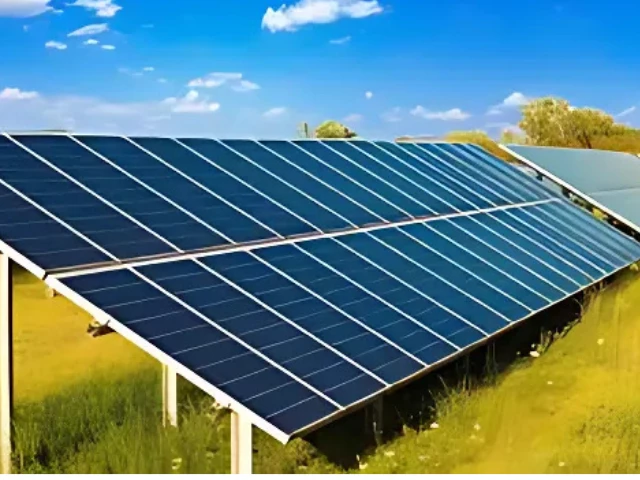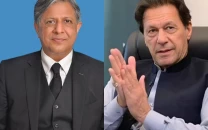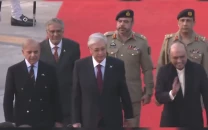Change in solar net metering policy put on hold
PM, cabinet members oppose changes in the policy amid widespread criticism

The government on Wednesday decided to expand consultations with all stakeholders regarding Solar Net Metering Regulations approved by the Economic Coordination Committee (ECC) before resubmitting final recommendations to the federal cabinet, halting the approval of an additional tax on solar energy consumers.
The decision was made during a meeting of the federal cabinet presided over by Prime Minister Shehbaz Sharif.
Both the prime minister and federal ministers opposed the proposed policy, directing the energy minister to review the net metering policy.
Earlier this month, the government had reduced the buyback rate by two-thirds to Rs10 per unit and scrapped net billing to stop the renewable energy growth through solar net metering amid high grid electricity costs.
The decision, applicable to new net-metering consumers, was taken at an ECC meeting.
Under the revised policy, power companies would buy excess solar electricity from consumers at a rate of Rs10 per unit during daylight hours, while grid electricity would be sold at Rs42 per unit during off-peak hours and Rs48 per unit during peak hours after sunsetexcluding taxes and duties.
Furthermore, consumers would be restricted from installing solar capacity beyond their sanctioned load, with only a 10 per cent allowance, whereas the previous policy permitted a 50 per cent margin.
Additionally, the cabinet approved the utilization of savings from reduced petroleum product prices to lower electricity tariffs for consumers, based on recommendations from the Power Division.
Further, on the recommendation of the Power Division, the cabinet authorized the Central Power Purchasing Agency (CPPA) to sign agreements on amended conditions with power plants operating on bagasse.
On the recommendation of the Ministry of Law and Justice, the cabinet granted in-principle approval for the Whistleblower Protection and Vigilance Commission Act, 2025.
As recommended by the Revenue Division, the cabinet approved further amendments to income tax, sales tax on services, and federal excise duties within the Islamabad Capital Territory. These amendments have been made as part of the Resource Mobilization and Utilization Reform Programme for policy action. Some amendments had already been introduced in 2023 and 2024.
The cabinet also approved the Income Tax (Second Amendment) Bill, 2025, restoring tax rebates for full-time teachers and researchers. Moreover, it endorsed the decisions made by the Cabinet Committee on Privatization (CCoP) in its March 11, 2025, meeting, along with approvals for decisions taken by the ECC on March 13 and March 21, 2025.
Separately, Minister for Power Division Sardar Awais Ahmed Khan Leghari on Wednesday assured the Senate Standing Committee on Power Division that existing net metering consumers would continue under their current contracts until expiration.
The committee which met with Senator Mohsin Aziz in the chair was further apprised that the consumers who installed solar panels without net metering would remain unaffected.
The minister said that the ECC has approved the policy, but cabinet approval was pending.
He emphasized that solar policy changes were necessary to avoid purchasing expensive electricity at public expense, adding that import duties on solar panels remain unchanged.
The minister said currently, 283,000 solar consumers generate 4,000MW. The new policy aims to lower solar system costs, making them more accessible.
The committee also discussed that the new net metering policy under which the government will purchase electricity from new solar consumers at Rs10 per unit instead of Rs27. However, electricity consumed between 6pm and 10pm will be charged at Rs45 per unit. Without this policy, electricity prices could rise by Rs3.50 per unit.
The Senate Standing Committee was briefed on the procurement of the Narowal Coal Power Plant (a govt-owned IPP) allegedly at the rate of Rs75,000/ton whereas the market price of coal is Rs40,000/ton. However, during the briefing, it was revealed that the issue was not about the Narowal Coal Power Plant but the Sahiwal Coal Power Plant.
It was also clarified that this plant is not a government-owned Independent Power Producer (IPP). The committee expressed concern over the incorrect information and asked for a detailed report to ensure transparency and accountability.
The ministry further deliberated regarding the on-going IPP's negotiation and timeline of expected relief for the public and industrialists. Pursuant to the efforts of Task Force, Power Purchase Agreements with 6 IPPs have been terminated, revised agreements for tariff reduction have also initialed with 8 Bagasse Power Plants and 14 IPPs of Power Policy 1994 & 2002. As per the relevant summaries of the Ministry of Energy (Power Division), the early termination of 5 IPPs would result in overall savings of around Rs411 billion.
Further, savings on account of revised tariff terms with 8 Bagasse Power Projects and 14 IPPs of Power Policy 1994 & 2002 is estimated around Rs 238 billion and Rs922 billion respectively over the remaining life of these projects.
The chairman expressed concern over the remaining 75 IPPs, questioning the delay despite the formation of a dedicated Task Force to expedite the process.
He emphasized the need for swift action to ensure timely relief.
The ministry informed the committee that negotiations are being conducted individually with each IPP, which requires time. However, the ministry assured that the process is expected to be completed by April or May, with a likelihood of finalization by the last week of April.
The committee has sought detailed information mentioned that, to date, the authorities have failed to provide the commencement date of these projects, the final price, and the local manufacturing cost of the plant.
The meeting was attended by Senators Syed Shibli Faraz, Mir Dostian Khan Domki, Manzoor Ahmed Kakar, Haji Hidayatullah Khan, Asad Qasim, Minister for Energy (Power Division) Awais Leghari and other concerned officials.
(With input from APP)



















COMMENTS
Comments are moderated and generally will be posted if they are on-topic and not abusive.
For more information, please see our Comments FAQ